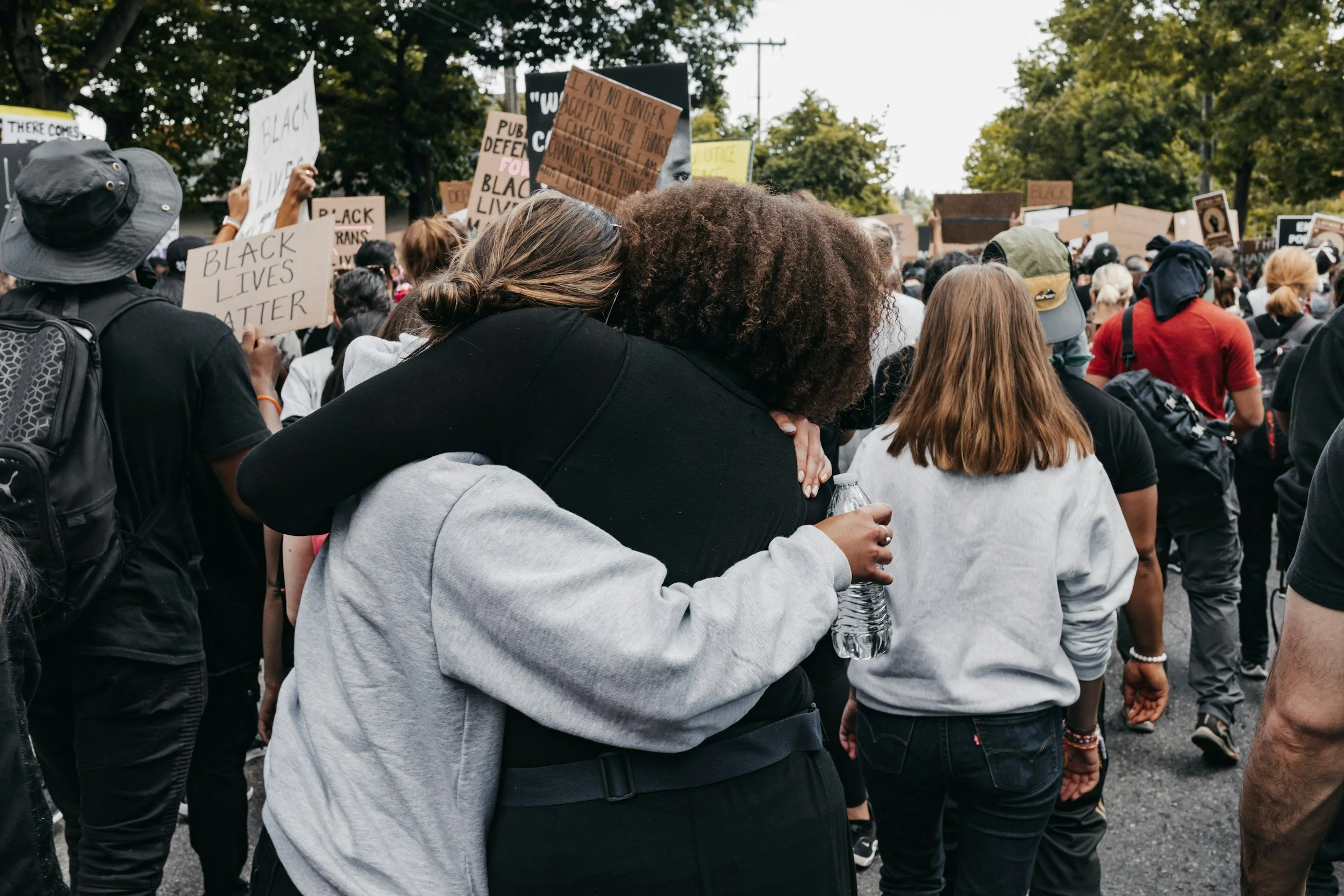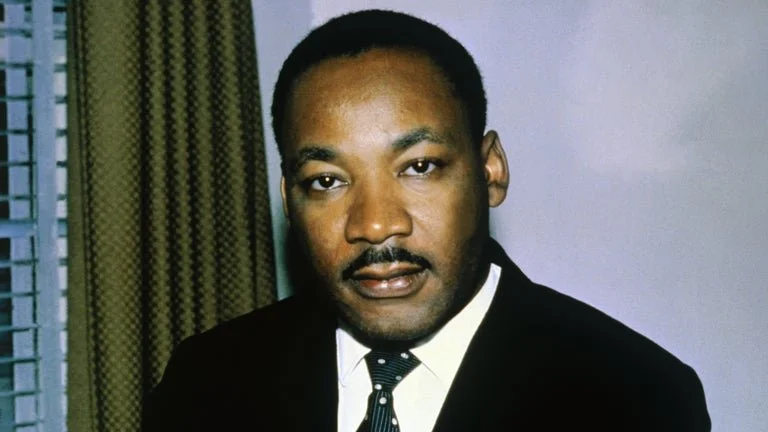A Christian Perspective On Race, Reconciliation, and Martin Luther King Jr.’s Dream
I was in middle school in the mid-1990’s when I first experienced racial tensions. Until that point, I can honestly say that race meant nothing to me, nor to most of the kids I went to school with. We didn’t pay attention to it, speak about it, or even acknowledge it. That wasn’t because it was a taboo topic, but because we just didn’t see one another through that lens.
We were a predominantly white school, but had a healthy black population too. My guess was we were a 65% white, 35% black school. But in school during my eighth grade year, something happened. I can’t tell you what or why, but it did. During lunch for a few weeks people started separating and hanging out according to their race. One group would make a comment to the other. The other would retaliate with calling someone in the opposing group a name.
One day it almost came to a head. Students stood face-to-face yelling at one another, daring someone to take a swing. Teachers stepped in and separated the groups. We were even forced to miss recess for a little while until the tensions settled. Again, I have no clue why this happened. But this was my first understanding that race and racial tensions were a real thing.
God's Concern for Justice and Equality: A Biblical Perspective
The Bible is filled with references to God's deep concern for justice, righteousness, and equality. From the earliest pages of Scripture in the Old Testament to the teachings of Jesus in the New Testament, God's heart for justice is made abundantly clear. It is crucial for Christians to recognize that racial justice, while a modern social issue, is deeply tied to biblical values that transcend political or cultural context. This issue is not simply about social equity; it is a matter that touches the very heart of God Himself.
God’s Justice Is Rooted in His Image in Us
The foundational truth that guides the biblical perspective on racial equality is the inherent dignity of every human being, regardless of race. In Genesis 1:26-27, the Bible teaches us that God created humanity in His own image: “Then God said, ‘Let us make man in our image, after our likeness...’ So God created man in his own image, in the image of God he created him; male and female he created them.” This verse reveals an essential truth—every human, without exception, bears the image of God. This divine image is not limited to any one race, ethnicity, or nationality, but it encompasses all people.
This understanding is critical to our view of racial justice because if all people are created in God’s image, then every individual deserves equal treatment, dignity, and respect. This biblical truth rejects the notion that any race is superior or inferior to another. When humans divide people based on race or ethnicity, they not only violate social justice, but they also defy God’s design for humanity. The attempt to dehumanize or segregate individuals based on race is, in essence, an affront to God’s creative work. It contradicts the divine intention for His creation to live in unity and reflect His image in the world.
The New Testament further emphasizes this truth. In Acts 10:34, the apostle Peter declares: “God shows no partiality.” This statement underscores the reality that God does not favor one group of people over another based on outward appearances such as race, social status, or ethnicity. God’s heart is for all people, and this profound truth challenges any form of racism or discrimination. It is not enough for Christians to recognize that God loves everyone; we are also called to extend that love in practical ways, confronting any structures or attitudes that perpetuate injustice.
Jesus: The Ultimate Example of Love and Equality
Jesus Christ is the ultimate embodiment of God's love for all people, transcending racial and cultural divisions. In His ministry, Jesus went out of His way to demonstrate the value of all individuals, regardless of their background or social standing. He consistently reached across cultural and racial boundaries, showing compassion, love, and dignity to those whom society often rejected or marginalized. Jesus' actions and teachings serve as the model for how Christians are to engage with issues of racial justice.
One of the clearest examples of Jesus breaking down racial barriers is His encounter with the Samaritan woman at the well, recorded in John 4. In the cultural context of Jesus' time, Jews and Samaritans were deeply divided, with centuries of hostility and animosity between them. Yet, Jesus not only spoke to this Samaritan woman—an act that defied cultural norms—but He also engaged her in a profound theological conversation, offering her living water (John 4:10). This encounter showed that the love of God extends beyond race and cultural boundaries. Jesus did not see the Samaritan woman as inferior or as an outsider, but He treated her with dignity, offering her the hope of salvation.
Jesus’ parable of the Good Samaritan (Luke 10:25-37) reinforces this message. In the story, Jesus challenges His audience by making a Samaritan the hero of the story—a radical move, considering the deep-seated prejudice between Jews and Samaritans. In the parable, the Samaritan man shows mercy and compassion to a Jewish man who has been beaten and left for dead, while the religious leaders—who should have been models of love and justice—pass by without helping. Jesus uses this parable to teach that true love and compassion transcend racial, cultural, and ethnic boundaries. The lesson here is clear: all people are our neighbors, regardless of their race or background, and we are commanded to love and serve them with the same selfless love that the Samaritan showed.
Further, in Matthew 22:37-39, Jesus affirms that the greatest commandments are to love God and to love our neighbors as ourselves. Jesus didn't qualify "neighbor" by race or nationality—He meant every person. The call to love our neighbors requires us to see the worth and dignity in every individual, including those who may not look like us or share our culture.
Martin Luther King Jr.: A Life Guided by Justice and Faith
Martin Luther King Jr. was a man whose life was deeply shaped by his Christian faith and his understanding of biblical justice. As the son of a Baptist preacher, Martin was exposed early to the teachings of Jesus, which he would later use as the bedrock of his advocacy for civil rights. He was taught that all people, regardless of race, are equal in God's sight, and this truth formed the lens through which he viewed the world.
From a young age, Martin Luther King Jr. encountered racism firsthand. One of the pivotal moments in his childhood came when a white friend’s parents told him they could no longer play together because of his race. The sting of rejection was profound, but rather than harbor bitterness, King sought solace in the Scriptures, wrestling with God's command to love his enemies (Matthew 5:44). His ability to turn to God in times of racial injustice would become a key feature of his life and mission.
King’s theology was rooted in the belief that justice was not optional for the believer—it was a divine command. Martin found a powerful calling in the words of the prophet Amos, particularly Amos 5:24: "But let justice roll down like waters, and righteousness like an ever-flowing stream." This verse not only resonated with King’s desire for racial equality but also provided him with the spiritual grounding for his nonviolent resistance to racial injustice. In King’s view, true justice could only come through love, peace, and a commitment to God’s higher law.
His belief in nonviolence was deeply influenced by the teachings of Jesus and Mahatma Gandhi, but it was also grounded in the biblical call to love one's neighbor and pursue justice. In Matthew 5:9, Jesus says, "Blessed are the peacemakers, for they shall be called sons of God." King embodied this peace-driven justice, leading the civil rights movement not through force or retaliation but through prayer, nonviolent protest, and a resolute commitment to truth and love.
The Legacy of Martin Luther King Jr.
Martin Luther King Jr.'s commitment to justice was not without significant personal sacrifice. His work placed him and his family in constant danger. King’s house was bombed; he was arrested more than 30 times; he faced continual threats against his life. Despite this, he never wavered from his conviction that love could triumph over hate and that justice could prevail through peaceful means.
King's dream for a racially just society was not simply an aspiration for social change; it was rooted in his Christian understanding of the kingdom of God. King often referenced his dream in speeches, and it centered around a future where people of all races would live in harmony, judged not by their skin color but by the content of their character. This dream aligned perfectly with the biblical vision of unity, as expressed in Galatians 3:28, "There is neither Jew nor Greek, slave nor free, male nor female, for you are all one in Christ Jesus." King saw this unity as not just a political or social goal but a divine mandate for all believers.
Moreover, King was fully aware of the cost of pursuing justice. He once said, “Faith is taking the first step even when you don’t see the whole staircase.” King’s unwavering faith in God’s plan sustained him through moments of fear and doubt. Psalm 46:1 reassured him: “God is our refuge and strength, a very present help in trouble.” King’s deep personal relationship with God was the foundation for his commitment to justice and his resilience in the face of adversity.
King’s legacy continues to inspire Christians to this day. His commitment to nonviolence, his insistence on loving one’s enemies, and his deep faith in God's justice challenge us to continue the work he started. While we may not face the same level of personal danger that King did, the battle for racial equality and justice is far from over. Systemic injustice, racial profiling, inequality in education and employment, and other forms of discrimination persist in our society today.
The Christian Call to Pursue Justice
The pursuit of justice is a fundamental aspect of God’s will for His people. It is not merely an ideal or a suggestion; it is a divine mandate that flows from God's desire for unity among His creation and His deep concern for the oppressed, marginalized, and voiceless. From the pages of Scripture, we learn that justice is a call to action, an active pursuit of righting wrongs, advocating for the powerless, and ensuring that all people are treated with dignity, regardless of race or background.
God’s justice is not just for the righteous but also for those suffering under oppression. The Bible repeatedly urges His people to defend the vulnerable and act in ways that bring justice to those who are denied it. In Micah 6:8, the prophet outlines what God requires: "To act justly and to love mercy and to walk humbly with your God." These words challenge us to embrace justice as not just a concept but a daily practice. Justice is not an optional endeavor for believers; it is woven into the fabric of our calling.
Throughout Scripture, we are reminded of God's deep concern for those who are oppressed. In Isaiah 1:17, God commands His people to “learn to do right; seek justice. Defend the oppressed. Take up the cause of the fatherless; plead the case of the widow.” This command extends to all areas of injustice, including racial inequality. It is not enough for Christians to remain silent in the face of injustice; we are called to actively engage in dismantling systems that perpetuate inequality and oppression.
James 2:1-9 further calls us to embody God’s justice by warning against favoritism. James reminds us that showing partiality—whether based on wealth, status, or race—is incompatible with the love of Christ. The Church is a body that must welcome all people, treating them with the same respect and love, regardless of their race or social standing. Our actions should reflect God's impartial love for all humanity, tearing down walls of division and fostering unity.
The Dangers of Holding Innocent People Accountable for the Sins of Their Ancestors
In recent years, a dangerous trend has emerged in discussions surrounding racial justice and accountability. There has been an increasing push to blame entire groups of people for the sins of their ancestors or previous generations. This ideology suggests that individuals today should bear responsibility for the wrongdoings of those who lived before them, often based on their ethnicity or social status. While the desire for justice is right and necessary, holding innocent people accountable for the actions of their forebears is not only misguided but also sinful. This is not the ‘justice’ that Martin Luther King Jr. fought so hard for.
It’s important to recognize that justice is not about punishing people for sins they did not commit. The Bible is clear that individuals are accountable for their own actions, not the wrongs of others. In Ezekiel 18:20, God declares, "The one who sins is the one who will die. The child will not share the guilt of the parent, nor will the parent share the guilt of the child." This passage underscores the principle of personal responsibility. Just as we are not responsible for the sins of those who came before us, neither should we be the target of unjust accusations simply because of our heritage or ethnicity.
The push to hold people accountable for the sins of previous generations can lead to resentment, division, and the perpetuation of hate. It fosters an environment where individuals are judged by their ancestry rather than their personal character and actions. This approach goes against the very principles of justice and reconciliation that Christ exemplified. Instead of building bridges, it erects walls between people, encouraging animosity and perpetuating cycles of bitterness that only hinder the pursuit of true justice.
Moreover, focusing on guilt by association leads to a false narrative of justice. It is one thing to acknowledge the sins of the past and seek to right the wrongs of history. But it is another to perpetuate injustice by targeting people who had no part in those wrongs. Hating or "holding accountable" individuals for the sins of their ancestors is, in itself, a form of injustice. It contradicts the gospel message of grace, forgiveness, and reconciliation. Jesus, who took on the sins of the world, did so not because we deserved it, but because He loved us. His call to forgive and love our enemies is a stark reminder that we are not to perpetuate cycles of hate but to pursue peace and healing.
True justice demands that we address wrongs in a way that is fair, compassionate, and rooted in personal accountability. It requires that we hold the right people accountable—the individuals who have perpetuated injustice in their own actions, policies, or systems—not those who are innocent of the wrongs done by others. By doing so, we reflect the heart of God, who is just but also merciful.
In the pursuit of racial justice, we must be careful not to fall into the trap of unjust judgment. The goal should never be to perpetuate division or sow discord among people based on past transgressions. Rather, we are called to heal wounds, confront systemic injustice, and work toward a future where individuals are judged by their character and actions, not the sins of their ancestors. This is the true path to justice—a justice that restores, reconciles, and reflects the love and mercy of our Creator.
Christian Responsibility: Actively Pursuing Justice
As Christians, our responsibility extends beyond passive opposition to injustice; we are called to actively pursue justice in every facet of our lives. The gospel compels us to be agents of change, speaking up for those who cannot speak for themselves and advocating for the oppressed. We are called to be a voice for the voiceless, standing with those who face racial prejudice and inequality, and working toward a world where all people are treated with fairness and dignity.
But how can we as Christians actively pursue justice?
Living Out the Gospel: At its core, the gospel is a message of reconciliation. It calls us to love our neighbors as ourselves (Matthew 22:39) and to seek unity in a divided world. Pursuing justice begins with confronting any prejudice in our hearts, despite our race, allowing the love of Christ to shape our attitudes toward others. This gospel-driven love compels us to tear down walls of division and reach out to those who are different from us.
Being a Voice for the Voiceless: Proverbs 31:8-9 commands us to speak up for those who cannot speak for themselves and to defend the rights of the poor and needy. In today’s society, many people continue to suffer due to racial prejudice, their voices silenced by systemic or perceived inequality. As Christians, we are called to advocate for racial justice, support policies that promote equality, and ensure that all people are given the opportunity to thrive. We are to empower those who feel like victims and encourage them to pursue goals through equal opportunities to work.
Practical Action: Addressing racial inequality requires more than just words—it demands action. We must educate ourselves about the ways racial injustice manifests in our society today, whether through systemic racism, unequal access to resources, or the persistent marginalization of people of color. It might also mean we push back on the narrative that all people of one race are naturally racist, or that people of color can’t be racist or hold anger or hatred towards another race. We must also take practical steps, such as supporting organizations that work toward racial justice, confronting racism within our communities, and participating in initiatives that promote fairness and equality for all people.
In embracing these responsibilities, we follow in the footsteps of Christ, who crossed cultural boundaries and showed love to all people. Jesus set the ultimate example by demonstrating love and justice to those on the fringes of society. Christians today are called to continue His work by advocating for justice, building unity, and breaking down the walls of division that still plague our communities.
Moving Forward: A Christian Response to Racial Justice
As we confront the ongoing challenges of racial injustice, we must approach the issue from a biblical perspective. Here are several ways Christians can contribute to the work of racial justice:
Prayer and Reflection: We must regularly ask God to help us see others through His eyes—without prejudice or bias. In prayer, we can confess our own shortcomings and ask for the strength to love others with the sacrificial love that Christ demonstrated.
Education: Understanding the roots and current manifestations of racism is essential. We must educate ourselves about the history of racial injustice and its contemporary impact on communities of color. This education helps us understand the structures that perpetuate inequality and empowers us to be agents of change.
Action: Awareness is only the first step. We must take concrete actions to combat racism, whether by supporting policies that promote racial equality, participating in community outreach, or standing in solidarity with marginalized communities. Justice requires not just recognition of wrongs but active participation in righting them.
Living Out the Gospel: Ultimately, the most powerful way to combat injustice is by living out the gospel every day. Through our love for neighbors, our service to the marginalized, and our commitment to equality, we reflect the heart of Christ and point others to the transformative power of His love.
The Bible clearly calls us to pursue justice. We are God's representatives on earth, tasked with bringing His justice and mercy to a world in need. As we continue to address racial injustice, we must do so with the heart of Christ, actively working to dismantle systems of oppression and create a society where all people are treated with dignity and respect. The fight for racial equality is far from over, but as Christians, we are called to carry the torch forward, seeking justice, loving kindness, and walking humbly with our God.
Martin Luther King Jr.’s life, fueled by his Christian convictions, reminds us that justice is an ongoing pursuit, not just a one-time achievement. As Christians, we are called to carry forward his legacy, driven by the love of God and a commitment to seeing His justice reign in all areas of society. With faith and action, we can continue to work toward a world where, as King dreamed, people are judged by the content of their character, not the color of their skin.





